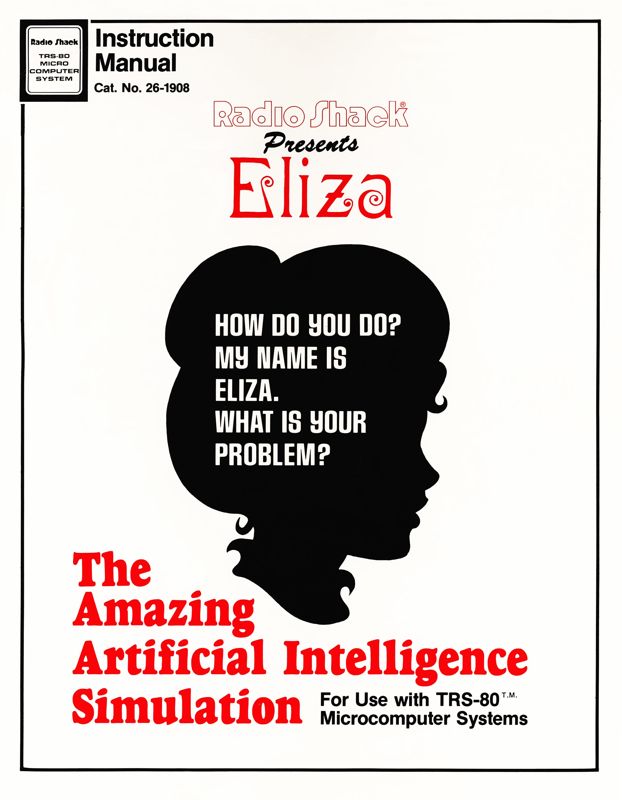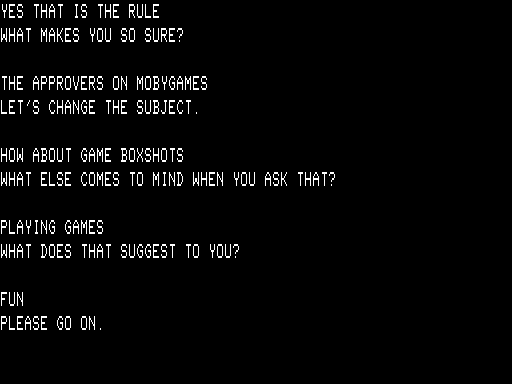Retro Replay Review
Gameplay
At its heart, Eliza is a conversation simulator that flips the traditional adventure formula on its head. Instead of typing commands like “go north” or “take lamp,” you simply respond to open-ended questions posed by the program. Each prompt is generated by sampling keywords from your previous replies, mimicking the style of a Rogerian psychotherapist. This lightweight mechanic means there’s no inventory to manage, no puzzles to solve, and no combat—just pure dialogue.
(HEY YOU!! We hope you enjoy! We try not to run ads. So basically, this is a very expensive hobby running this site. Please consider joining us for updates, forums, and more. Network w/ us to make some cash or friends while retro gaming, and you can win some free retro games for posting. Okay, carry on 👍)
The pacing of Eliza sessions is entirely in your hands. A new question appears only after you’ve typed your answer, and the program even simulates typing errors or pauses to reinforce the illusion of a human interlocutor. The experience can feel eerily immersive; more than once you may find yourself pausing, wondering if the program has truly “understood” you. That sense of spontaneity keeps the conversation flowing and encourages you to explore deeper emotional or philosophical topics.
Despite its simplicity, the conversational engine is robust enough to convince many users that they’re speaking with a real person—so much so that early testers sometimes believed they had genuinely fooled the Turing Test. The interaction never grows stale, as each question dynamically changes based on your own input. In this way, Eliza manages to feel both infinite and deeply personal, rewarding players who approach it with curiosity and honesty.
Graphics
Developed in an era when graphical displays were still a novelty, Eliza relies on plain text rendered in a monospaced font—often on a green-or-amber-phosphor terminal. There are no sprites, no backgrounds, and no color palettes beyond the basic text color. What appears to be a limitation, however, becomes part of the charm: the stark screen invites you to imagine the setting, the therapist’s office, and even the tone of voice behind the typed words.
The simulated typing effect adds a subtle theatrical layer, creating the sensation of someone hesitating, correcting themselves, or searching for the right word. These “errors” are intentionally programmed to heighten your suspension of disbelief, making each line feel less like computer code and more like genuine human speech. It’s a masterclass in using minimalism to fuel immersion.
Modern players accustomed to 3D environments or hi-res artwork may find the visual presentation underwhelming at first glance. Yet once you begin interacting, the lack of graphical distractions becomes a strength. Your focus shifts entirely to the words on the screen, which carry all the emotional weight and narrative thrust. In many ways, the bare-bones ASCII aesthetic is exactly what allows Eliza to remain timeless.
Story
Unlike traditional games with scripted plots, Eliza crafts its “story” in real time, drawing from the player’s own thoughts, fears, and revelations. There is no fixed narrative arc; instead, each session unfolds as a collaborative exploration between you and the program. The game’s role is to guide, to listen, and to mirror, rather than to dictate events or present cutscenes.
Through cleverly designed Rogerian prompts, Eliza invites you to open up about personal experiences, aspirations, and anxieties. As the dialogue progresses, patterns emerge—recurring keywords trigger deeper questions, leading you to revisit emotions you might have buried. In effect, the storyline is whatever you bring to the keyboard, making every playthrough unique.
Though there is no final boss or dramatic climax, the emotional resonance can be profound. Many players report feeling a surprising sense of relief or new self-awareness after a session. By turning the spotlight inward, Eliza demonstrates that storytelling need not be linear or action-driven—sometimes the most compelling journey is the one within our own minds.
Overall Experience
As a pioneering work in artificial intelligence and interactive fiction, Eliza occupies a special place in gaming history. Its conversational interface directly influenced early text adventures like Adventure and Zork, and it paved the way for future experiments in AI-driven narratives. Playing it today is like meeting the ancestor of modern chatbots—witnessing firsthand the moment when computers first dared to converse.
Though it lacks flash and fireworks, Eliza offers an experience that is at once intimate, introspective, and historically significant. It challenges modern gamers to look past graphics and mechanics, and to engage with the core question: what makes an interaction feel genuinely human? For those willing to embrace its minimalist style, the reward is a thought-provoking meditation on communication and self-discovery.
Potential buyers seeking a traditional storyline or fast-paced action may be surprised by Eliza’s gentle pace and text-only interface. However, if you’re fascinated by the roots of AI, interested in experimental narrative forms, or simply curious about what a computer-led therapy session feels like, Eliza remains an unforgettable journey into the early days of artificial empathy.
 Retro Replay Retro Replay gaming reviews, news, emulation, geek stuff and more!
Retro Replay Retro Replay gaming reviews, news, emulation, geek stuff and more!









Reviews
There are no reviews yet.